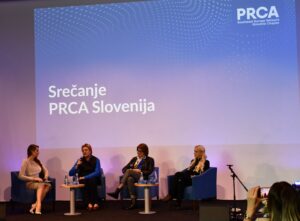Last week, on 19.10.2023, the first PRCA Slovenia gathering happened in Ljubljana. PRCA Southeast Europe Network Slovenia Chapter Chair, Katja Fašink, Chief Communication Officer of “ELES, d.o.o.”, combined transmission and distribution system operator of the Republic of Slovenia invited to a panel on Infrastructure communication: communicating critical infrastructure in crisis events, her colleagues from abroad, Eleonora Albijanić, Chair of PRCA Montenegro and Head of External Communications “Elektroprivreda Montenegro”, and Nada Kolega, who is Press Officer of “Hrvatski operator prijenosnog sustava d.d.” (HOPS), where they established a few challenges that they have to fight together.

One of the biggest is that in the energy industry, people working in public relations cannot shut their phones down, cannot have bad moments or days, and postpone ko work till tomorrow. They stressed future challenges and defined similar problems in different cultures or environments. However, the world of energy needs to win these disrupted times and have a solid backbone for systems that need to upgrade, modify, and adjust to the needs of people and nature. Facing hard times that will come, they decided to stay optimistic and fight all uncertainties in the energy industry. They promised to keep up the excellent work and continue raising standards in communication and the energy industry.
The challenges and opportunities of infrastructural, operational communicators wrapped in concluding thoughts:
Eleonora Albijanić: “Why do we have challenges in communication in the energy sector? Why do customers not know which entity is a transmitter, which distributor or supplier? In my opinion, information and education are among the leading PR roles in the energy sector. People do not perceive electricity as a good that is on the market and whose price depends on offer and demand; it is not a social category anymore. We must be careful in communication when choosing target groups and channels through which we send them messages. There are numerous publics to communicate within a complex energy sector, the backbone of each country and economy. At the end of the communication process, how do we measure and evaluate our work? Are those results showing the impact of our work on business results? Katja introduced the data about building interstate electricity connections for three years, where a few million was earned/saved with consistent, proactive, and professional communication. But measuring the results of a hard crisis and that crucial moment where we act as a first defense line still stays challenging even though we primarily minimize the strongly negative risks that could influence the public opinion, reputation or the profit of our companies.”
Nada Kolega: “I am glad that we also introduced ourselves and met publicly and so spontaneously entered into a typical story of informing citizens in the field of electricity, a topic that is interesting to most consumers only when they do not have electricity. Since it is the most complex technical system, bringing such a complex system closer to the general public is only possible through high-quality and continuous information within the company, PR. In our case, the media and the public accept this continuity because, besides accurate and verified information, the presenter, the person who addresses the public, is also essential. That is why, among other things, I perform the spokesperson function. I am delighted with our panel because we opened up a handful of topics and found quality solutions for further work.”
Katja Fašink: “In my work, we do not have young people who consider our professions attractive. So, It is up to us to at least popularize and “normalize” our professions. We must develop communication system solutions for the vast field of interests of our stakeholders, for PR’s constant availability, the willingness to prepare a complete text or answers to complex questions in a few minutes, and irregular working hours, which the interests of demanding stakeholders often shape these. However we communicators are becoming more resilient, stable, and organized than ever. And we will do even better because we will take care of these upgrades ourselves. In my colleagues who perform the same profession as mine, I found not only a more profound connection but also a lot of inspiration and motivation. When we build friendships, connect, and support each other, we create the most solid network, a quality foundation for younger colleagues, whom I hope will motivate them to step into our shoes and walk in them as strongly as we do, even when the winds of interest are blowing hard. If we introduce them to the best teachers from whom they can learn, the best world-known practices that contribute to a safe future and enable them to express themselves and succeed as outstanding professionals in the energy communication industry in or outside the region, we will fulfill our mission to the best of our ability.”
